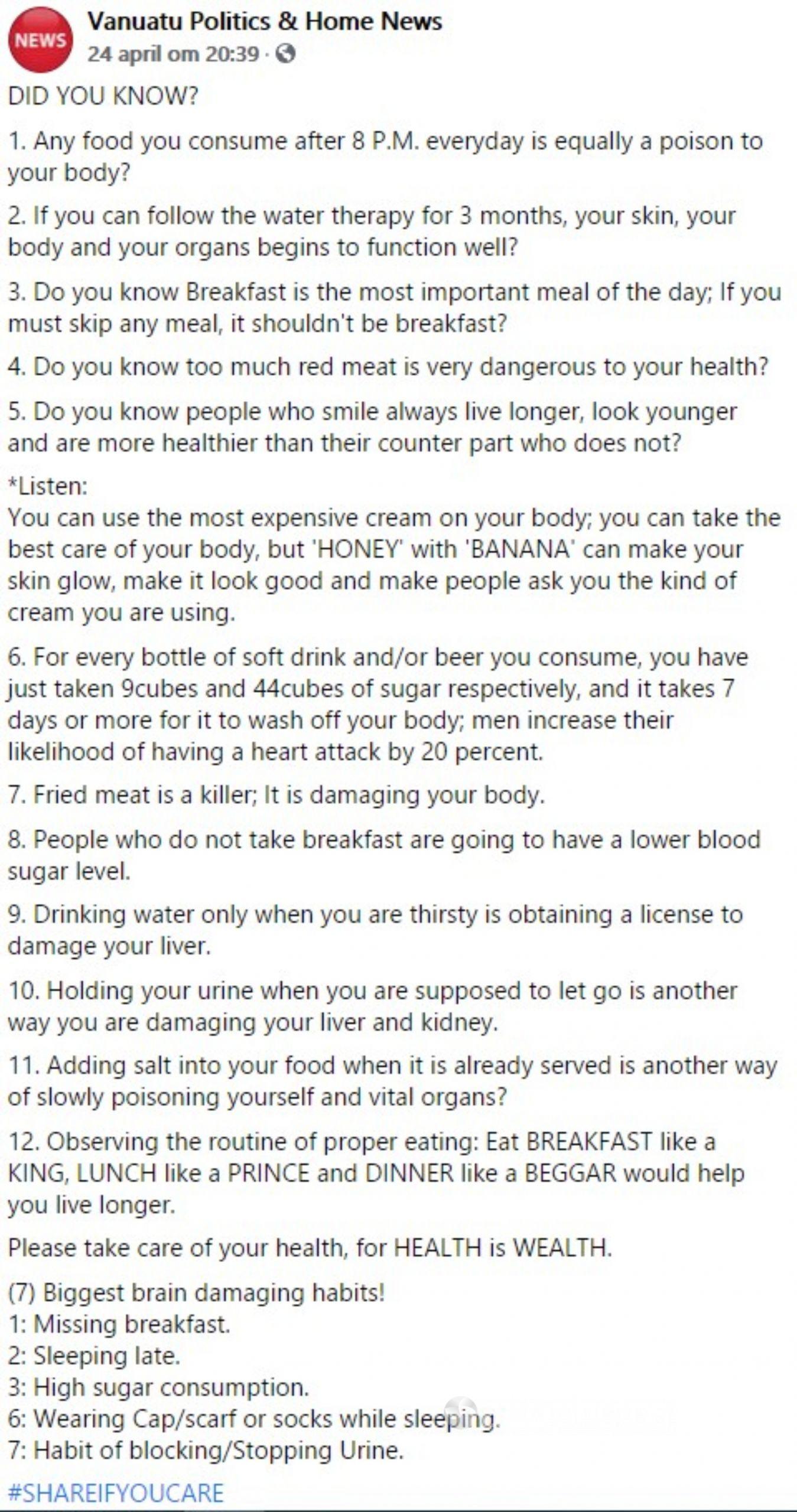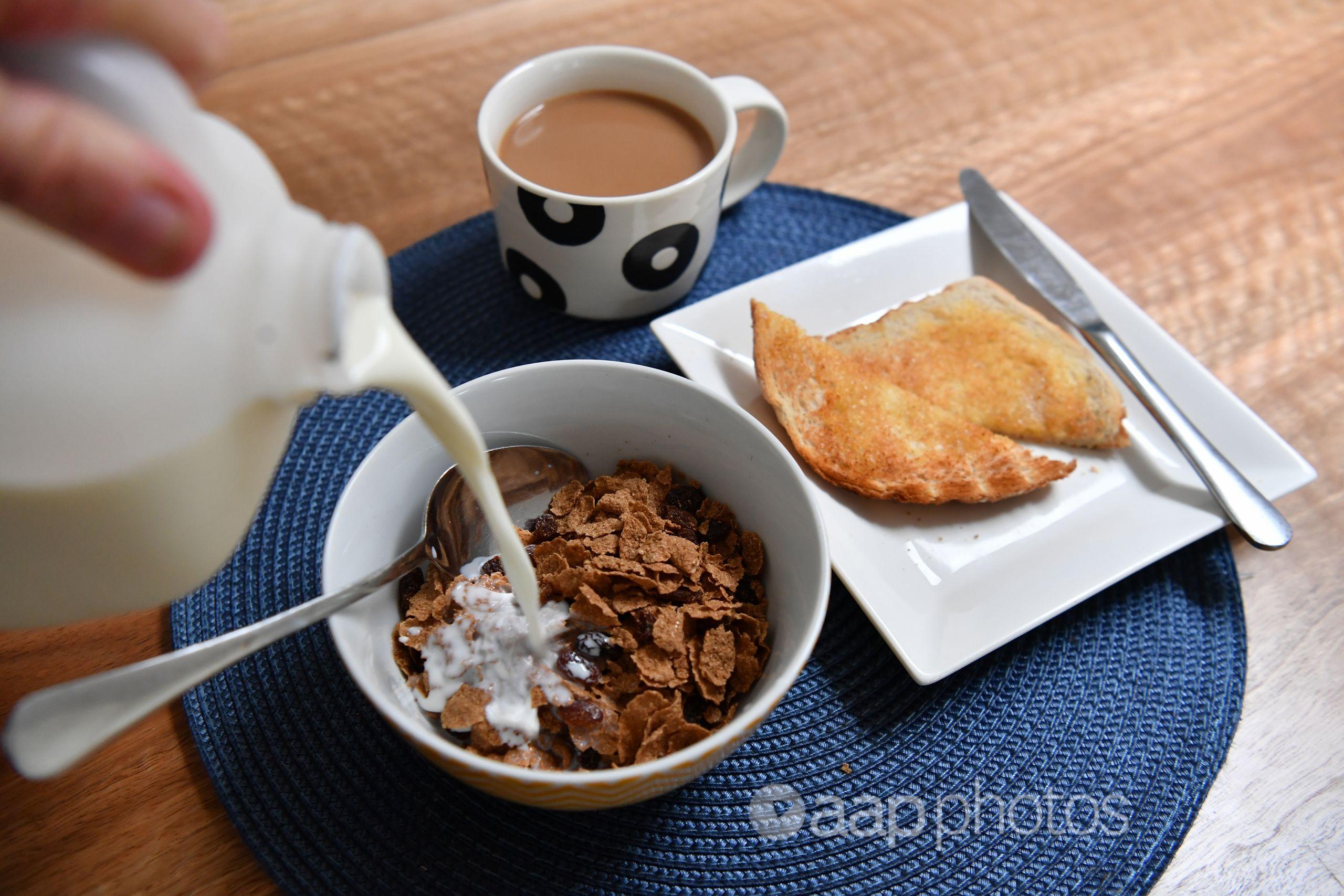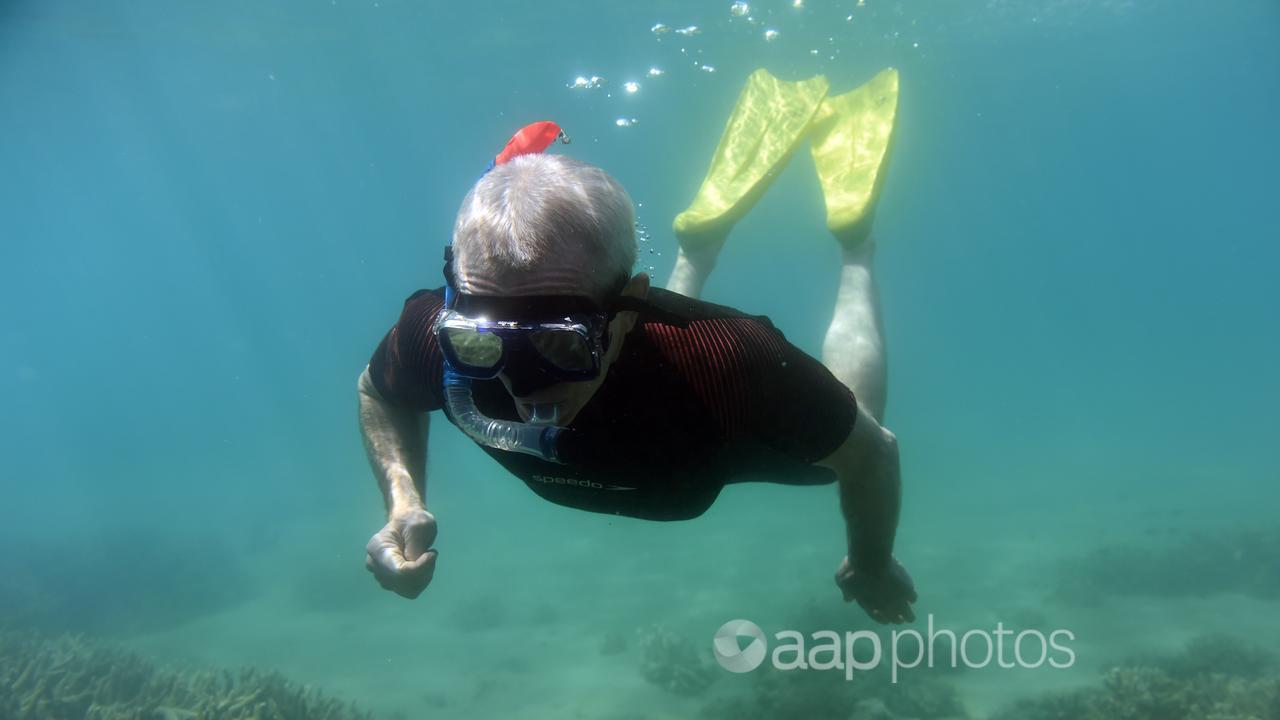The Statement
A Facebook post features a list of health advice, including a claim that food consumed after 8pm becomes “a poison to your body”.
The warning, posted by a Vanuatu-based page on April 25, contains 12 tips following on from the question, “Did you know?” They include the claims that people who don’t eat breakfast will have lower blood sugar levels and drinking water only when thirsty is a “license to damage your liver”.
The post finishes with the message, “Please take care of your health is wealth”, before listing the seven “biggest brain damaging habits” as: “Missing breakfast; sleeping late; high sugar consumption; wearing cap/scarf or socks while sleeping; habit of blocking/stopping urine.”
The same list features in posts from as early as January 2020. The Vanuatu post had been shared more than 3500 times and generated more than 950 reactions at the time of writing.

The Analysis
The Facebook post purportedly provides a “routine of proper eating” – but its tips in reality includes some jumbled and misleading advice.
Eating after 8pm is not a “poison to your body”, and a similar claim was debunked in early 2020. Nevertheless, however studies have shown that earlier food intake can be linked to lower body mass index and chance of obesity, and greater weight-loss success.
Much of the research has focused on the benefits of eating larger meals in the morning and during the day, and smaller meals at night, although a large-scale study in Japan found that a habit of late-night dinner eating alone – defined as consuming the meal within two hours of bedtime at least three days per week – was linked to hyperglycemia.
A 2019 review on the timing of breakfast, lunch and dinner by academics in Spain, concluded: “Unusual eating time can produce a disruption in the circadian system that might lead to unhealthy consequences.”
However, the review said a relevant aspect of meal timing studies was to define a “late dinner”, suggesting that 8pm is an arbitrary external deadline.
“Dinner at 9pm may be a late circadian dinner for those subjects with melatonin onsets at 7pm, but it may be an early circadian dinner for those whose biological night starts at 1am,” it says.
So is there any chance that food consumed after 8pm can become a poison?
Not according to Dunedin-based dietitian and author Jennifer Douglas, who told AAP FactCheck that since not everyone needed to worry about their weight, it could hardly be considered “poison” if healthy food was consumed late at night.
“Overall intake of food is important for the maintenance of healthy body weight, but how food is distributed over the day can be quite individual and calories are calories no matter what time of day you have them,” Ms Douglas said in an email.
Dr Nancy Snyderman came to a similar conclusion in an article for Time Magazine, writing: “It doesn’t matter what time of day you eat. It is what and how much you eat and how much physical activity you do during the whole day that determines whether you gain, lose, or maintain your weight. No matter when you eat, your body will store extra calories as fat. If you want a snack before bedtime, think first about how many calories you’ve eaten that day.”
For the claim that people who don’t eat breakfast will have lower blood sugar levels, guidance by the Centers for Disease Control and Prevention (CDC) states the opposite: “Going without that morning meal can increase blood sugar after both lunch and dinner.”
Studies have also linked skipping breakfast to higher blood sugar levels. Ms Douglas said the post contradicts itself on the claim.
“They encourage people to have breakfast and then say if you don’t have breakfast then you have lower blood sugar level. Well, if you have diabetes or pre-diabetes (which is common in the Pacific nations), a lower blood sugar level is going to be desirable.”
A 2019 systematic review and meta-analysis of studies into skipping breakfast concluded the practice was linked with an increased risk of type 2 diabetes. But when it came to weight loss and breakfast, a 2018 review of controlled trials concluded: “Caution is needed when recommending breakfast for weight loss in adults, as it could have the opposite effect.”
Ms Douglas told AAP FactCheck: “There are also plenty of studies showing positive relationships between eating breakfast and achieving weight loss. So the jury is out! Therefore telling people that they should eat breakfast when they never have may not actually lead to better outcomes.”
For the claim that drinking water only when thirsty can cause liver damage, a 2010 review on water, hydration and health found that thirst is not the only way water intake is controlled in healthy people. However, it does note that it may be beneficial for the elderly to learn to drink regularly when not thirsty as their thirst responses may be weaker than those of younger adults.
Toby Mündel, a senior lecturer in Massey University’s School of Sport, Exercise and Nutrition, wrote for The Conversation that by the time you feel thirsty your body is already dehydrated, because our thirst mechanism lags behind our actual level of hydration.
However, dehydration is most closely linked with kidney rather than liver damage. Kidney Health Australia advises: “Your body will tell you when you are thirsty. Dehydration means your body does not have enough water and being thirsty is often a sign of already being dehydrated.”
Some health experts argue we don’t need to aim for eight glasses of water per day – and that the best gauge of hydration level is our urine colour, which should be light yellow.
Ms Douglas noted that drinking excess water could cause its own health problems, such as kidney damage, however to do so one would have to consume around five times the standard daily intake. The Mayo Clinic notes that drinking excess water could lead to life-threatening sodium deficiency, but this was rarely a problem for healthy adults.
Ms Douglas also dismissed the post’s claim that “for every bottle of soft drink and/or beer you consume, you have just taken nine cubes and 44 cubes of sugar respectively, and it takes seven days or more for it to wash off your body; men increase their likelihood of having a heart attack by 20 per cent”.
“Sugar does not ‘wash off your body’ … as for increasing heart attack in men, well yes, excess sugar leads to weight gain and this increases cardiovascular risk, but every bottle you drink does not increase your risk by 20 per cent.”
Ms Douglas said the post showed a lack of knowledge and confusion that many people feel around food.
“Using words such as ‘poison’ certainly helps with ‘click bait’ but it does not help people feel empowered to make behaviour changes and makes people feel guilty that the current way they are eating is harmful,” she said.

The Verdict
The post includes several dubious health claims. Eating food after 8pm is not “poisonous”, skipping breakfast does not generally lead to low blood sugar levels and drinking a bottle of soft drink or beer does not dramatically increase the risk of heart attack.
Experts say thirst can be an indicator of dehydration, as implied in the post, but that excessive water intake can also be dangerous.
Partly False – Content that has some factual inaccuracies.
AAP FactCheck is an accredited member of the International Fact-Checking Network. To keep up with our latest fact checks, follow us on Facebook and Twitter.
All information, text and images included on the AAP Websites is for personal use only and may not be re-written, copied, re-sold or re-distributed, framed, linked, shared onto social media or otherwise used whether for compensation of any kind or not, unless you have the prior written permission of AAP. For more information, please refer to our standard terms and conditions.

















